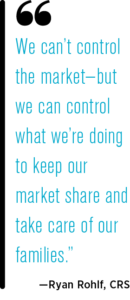Resilience is necessary for agents and teams navigating a tumultuous market
By Scott Mason
Shifts in the residential real estate market can result in feelings of uncertainty for agents of any experience level. Some real estate professionals will panic at the sight of volatility. However, successful agents and teams must be resilient to stay afloat during the storm of uncertainty.
 Ryan Rohlf, CRS, owner of the dsmSOLD Team with Keller Williams Legacy Group in Des Moines, Iowa, says he and his team are quite resilient considering the market circumstances. “This year is already starting a lot different than last year for my team,” he says. “Last year, it was a very slow January through March for us. But now, consumers are getting used to interest rates, and it just feels more ‘normal.’”
Ryan Rohlf, CRS, owner of the dsmSOLD Team with Keller Williams Legacy Group in Des Moines, Iowa, says he and his team are quite resilient considering the market circumstances. “This year is already starting a lot different than last year for my team,” he says. “Last year, it was a very slow January through March for us. But now, consumers are getting used to interest rates, and it just feels more ‘normal.’”
While business is stabilizing for Rohlf and his team, it’s important to note that had they not stuck to plans and made things work, they may have been in a less favorable position this year. To help other agents, Rohlf shares strategies that have helped him and his team adapt and survive tough times.
Thinking positive thoughts
A team leader must be in step with each team member to ensure the best productivity. To accomplish this, Rohlf meets weekly with each team member to check their work status. “With administrative staff, we talk about how operations are going,” he says. “With agents, we’re talking through their current pipeline, follow-up strategy and things like that. I’m sharing with them approaches that work for me, not things I’ve never done myself.”
Rohlf makes a point of having his staff think positively as a team. One practice he adopted is to start every morning by sharing recent successes and what everyone is grateful for. “Even before the market change, my team will walk through what we did yesterday, what we’re doing today and list three things we’re grateful for,” he says. Team members will share these affirmations, kicking off the day constructively.
Rohlf says this has proven to keep his team focused and resilient, as there is often much negativity in the real estate industry. “You deal with a lot of rejection in real estate,” he says. “It gets us thinking more positively and not dwelling on the bad. We can’t control the market—but we can control what we’re doing to keep our market share and take care of our families.”
Patience and planning
Rohlf’s best advice for resiliency is to treat the real estate profession with the respect it deserves. He has noticed that the less successful agents are often lackadaisical or do not take their work seriously. “The potential income earnings within real estate are essentially endless, but you have to put the time into it,” Rohlf says. “It’s not necessarily a job that you could do in 40 hours a week.”
While some agents can perform at a high level while operating on “normal” 9–5 hours, Rohlf says that scheduling is often the key to success. He will ask his team members, “How are you managing your schedule? Are you lead generating and making the connections that you need to be?”
He says doing these activities, even without immediate success, will bring about more business. “Sometimes, I reach out to 10 or 15 people in an hour and don’t get any responses,” he says. “It’s kind of defeating, but simply performing the tasks will keep you on the right path.”
Staying on the right path, as Rohlf puts it, will open up future opportunities for agents willing to stick with it. “So many times, I’ve gotten an email or text from a prospect or client looking to buy or sell months after my initial outreach,” he says. “And I get them because I continued to follow up.”
With this motivation and mindset, agents and teams can stay resilient during any market fluctuation and build toward a better future in the business.
A Focus on Mental Health
When difficult times arise, residential real estate agents should prioritize their mental health. Ryan Rohlf, CRS, owner of the dsmSOLD Team with Keller Williams Legacy Group in Des Moines, Iowa, says that seeing a mental health professional has done wonders for his personal well-being and his business.
“Real estate agents deal with many different things—rejection, the ups and downs of the market, the cyclicity of the job. Having a relationship with a therapist has really helped me this past year,” Rohlf says. “Sometimes, having somebody looking from the outside in can help you understand what you need to do to get out of a funk.”
In a cut-throat industry like real estate, your mind is often your best asset—and caring for it should take precedence. “It links back to your productivity,” Rohlf says. “How you feel is directly connected to your motivation to do the best business.”
Hear how experts are navigating the new normal in the latest episodes of RRC’s “Real Estate Real Talk” podcast at CRS.com/resources/real-estate-real-talk.








